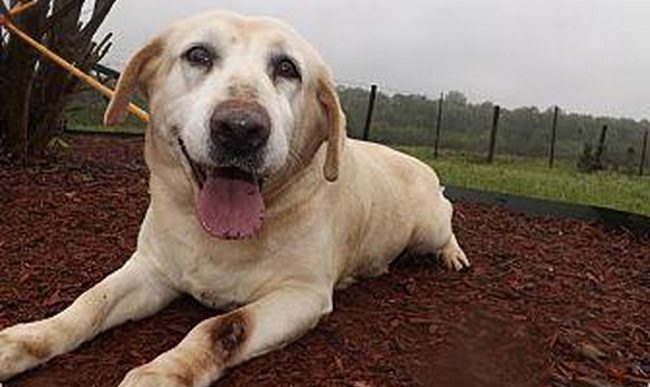To honor those animal care workers who suffer from compassion fatigue, all of the animals pictured in this article are available for adoption.
In September of 2014, 48-year-old veterinary behaviorist and best-selling author Dr. Sophia Yin died of suicide. Dr. Yin was a trailblazer in the dog training community. She wrote books, created instructional videos, and developed tools for positive reinforcement training.
In the Huffington Post, Anna Jane Grossman writes that it is impossible to understate Dr. Yin’s contribution to the world.
It is, perhaps, this overwhelming dedication to animals that led her to take her own life. According to those closest to her, Dr. Yin likely suffered from compassion fatigue.
Charles Figely, Ph.D., Director of the Tulane Traumatology Institute, defines compassion fatigue as:
“Emotional exhaustion, caused by the stress of caring for traumatized or suffering animals or people.”
Compassion fatigue is also known as “secondary-traumatic stress disorder” (STSD). The symptoms of STSD are similar to PTSD. As with PTSD, compassion fatigue can lead to depression and thoughts of suicide.
STSD is not rare and Dr. Yin’s suffering was not unusual.
The first ever mental health survey for veterinarians revealed that one in six of them have contemplated suicide. A recent study by the American Journal of Preventive Medicine reveals that animal rescue workers have a suicide rate of 5.3 in 1 million workers. This is the highest suicide rate among American workers; a rate shared only by firefighters and police officers. The national average suicide average for American workers is 1.5 per 1 million.
Jessica Dolce, a Certified Compassion Fatigue Educator, says,
“Compassion fatigue is an occupational hazard of our work with animals, whether you are an animal control officer or kennel attendant in a small town or an internationally recognized veterinarian. Our work requires that we compassionately and effectively respond to the constant demand to be helping to those who are suffering and in need.“
Yet, no one is discussing this very real and very prevalent epidemic. Perhaps that is because we think of animal care as more practical than emotional.
Justina Calgiano, Director of Public Relations and Special Events at the Delaware County SPCA, a private lifesaving animal welfare organization just outside of Philadelphia, spoke to us about this, saying:
“Setting personal limits is hard in animal welfare, because it’s not ‘just a job’ – it’s like a religion.”
This means that even success stories leave their own scars. In fact, according to Colleen Mehelich of CompassionFatigue.org, STSD is only minimally related to euthanasia.
Calgiano remembers a particularly difficult case involving a Pit-Bull named Precious whom repair workers found locked in a flooded basement.
“She was found amidst a flood of water, steam, and an outbreak of fleas. She weighed a devastating 17 pounds. She couldn’t even lift her head, let alone walk. We had workers come to the shelter in shifts around the clock to spoon feed her and flip her body to prevent bed sores. After investigation, it was discovered that her mom, Angel, died in the basement from starvation – the same fate Precious would have suffered.”
Now Precious lives a joyful life with a loving family of both humans and other dogs. Still, the trauma of witnessing Precious’s struggle will never leave Calgiano.
Success stories are not always possible. This is often due to medical reasons, behavioral issues, or most tragically for rescue workers, a lack of space.
The Delco SPCA once functioned as more of an animal control facility than a haven. In 2009, 2,325 animals were euthanized, while 1,845 were adopted.
Thanks to the help of their Executive Director, Richard Matelsky, Delco SPCA is now a no-kill shelter. Euthanasia only occurs for medical or extreme behavioral reasons. The shelter is now listed as one of the best in the country.
Not every shelter has the opportunity to go from “high-kill” to “haven.” The mental and physical stressors in those environments can be debilitating to the people who work there.
While it’s easy to suggest to these workers to take time for themselves and practice self-care and stress management, it’s not as easy to put those techniques into practice. The majority of rescue workers are volunteers with separate careers.
On top of that, finding foster homes for animals in need is a difficult task, leaving rescue workers and veterinarians to take as many animals as possible into their own homes. Many of these pets have severe behavioral and/or medical issues due to the way they have been treated in the past.
The nature of the work is not the only thing impacting the mental health of animal welfare workers. The nature of the workers is also at play here.
Molly Sumner, a QPR trained Gatekeeper who helps people during times of crisis, notes that those with a deep compassion for animals take a considerable amount of weight on their shoulders. Because animals cannot speak for themselves, rescuers feel they must break their own personal limits to give a voice to those in need.
Psychotherapist J. Eric Gentry tells the Sacramento Bee:
“Animal care professionals are some of the most pain-saturated people I have ever worked with. The very thing that makes them great at their work, their empathy and dedication and love for animals, makes them vulnerable.”
With little time to care for themselves, it’s important that animal workers connect with support programs.
People like Elizabeth Strand, Founding Director of Veterinary Social Work at the University of Tennessee in Knoxville (UTK), are taking steps to increase access to support services. Veterinary social workers receive training similar to that of regular social workers, but they also learn how to address the specific needs of animal care workers.
Veterinarian Kate Knutson tells SocialWorkers.org:
“We learn the technical and scientific skills, but what we’re not getting enough of is communication and relationship skills. Veterinarians desperately need better communication skills.”
UTK has also launched S.A.V.E., Suicide Awareness in Veterinary Education, which provides mental health information to veterinary students.
In the United Kingdom, the Royal College of Veterinary Services launched the Mind Matters Initiative in December 2014. The program’s main focus is to reduce stigma, raise awareness and identify risk factors. The program also funnels funding to the Vet Helpline, which offers services for people in immediate crisis.
In addition to these services, many in the field advise that realism is one of the best method of staving off crisis.
Mehelich feels that it is important to experience and accept feelings of sadness and loss. Avoiding them lets them fester and build up.
Dolce agrees:
“When we recognize that it’s perfectly normal to be affected by our work, we can more easily take steps to better manage the impact of compassion fatigue on our lives. Start by educating yourself and your staff. We can’t address what we don’t understand. Read a book, take a class or webinar.”
Calgiano adds that setting small boundaries is helpful. Something as simple as not checking your email for a few hours on the weekend may give your emotions time to recharge.
Nearly all animal care workers agree that your first line of defense against compassion fatigue is to accept the reality that you cannot save everyone. Take things one day at a time and do not underestimate the importance of saving one life. That one act makes a world of difference to that animal and to the humans who will love them.
If you or someone you know is in crisis, contact The National Suicide Prevention Lifeline. Call 1-800-273-TALK (8255) to be connected to a skilled, trained counselor at a crisis center in your area, anytime 24/7.
Featured image via Flickr User Jesús Alenda.
Sources: The Art and Science of Animal Behavior, The Huffington Post, PetFinder, Psychiatric Times, American Journal of Preventive Medicine, American Veterinary Medical Association, Jessica Dolce, CompassionFatigue.org , Delaware County SPCA, Kindred Companions, The Sacramento Bee, SocialWorkers.org, UTK, Royal College of Veterinary Services.


Leave A Comment